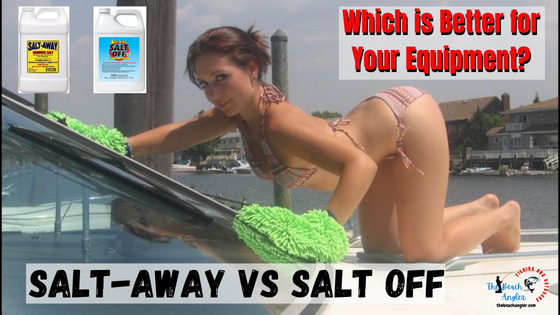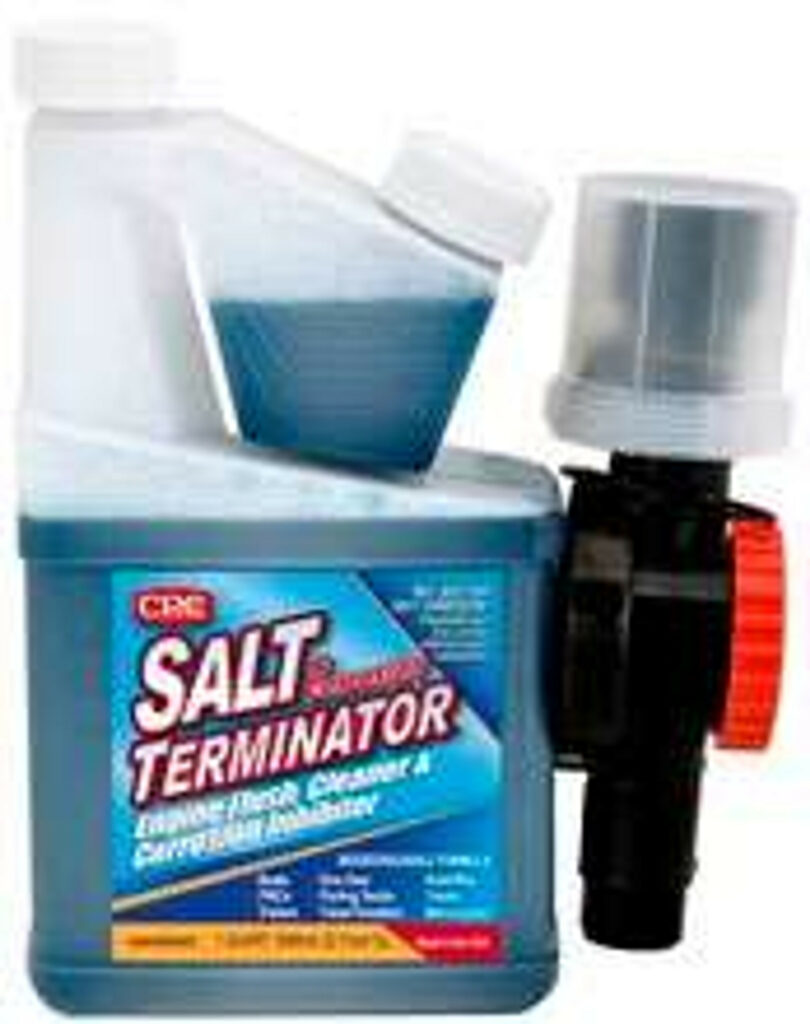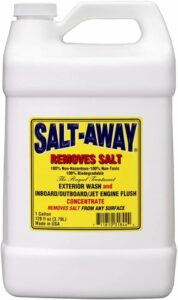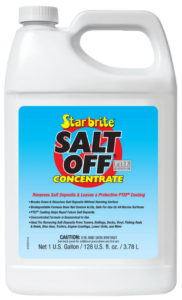In the world of boating, fishing, and marine maintenance, keeping your equipment clean and corrosion-free is essential for longevity and performance. Two popular products, Salt-Away and Salt Off, claim to be the go-to solutions for this task. But when it comes to Salt Away vs Salt Off, which one should you choose?
Now, if you live near the ocean or in a coastal area, you know how damaging salt, and the saltwater environment, can be to your car, boat, fishing gear, or other metal surfaces. Salt can cause corrosion, rust, stains, and damage over time that can ruin the appearance and functionality of your valuable equipment. To combat this, various products have emerged, and among the top contenders are Salt-Away and Salt Off. But which product should you choose?
Both promise to remove salt and protect your gear, but they each have some unique features and applications. Let’s explore these two products in detail. Follow along and we’ll delve into the differences between Salt-Away vs Salt Off, helping you make an informed decision. We will also mention some other salt removal products that you may want to consider.
Salt-Away vs Salt Off: Key Features Comparison
Salt-Away: Kills Salt Pure and Simple
Salt-Away is a water-based, non-hazardous, biodegradable salt removal solution which can be used to dissolve and remove salt crystals from surfaces if levels of contamination are unacceptable. Salt-Away is a water-based, non-hazardous, biodegradable solution and contains properties that dissolve, release and remove salt crystals from any surface.
Water alone does not remove all the salt from a surface. Salt-Away has a dense foaming action when applied, which acts as an indicator where it has been applied and helps the solution cling to surfaces to slowly soak through layers of salt build-up. Use of Salt-Away does not correct past damage but will work to protect against salt corrosion and reduces costly repairs caused by salt.
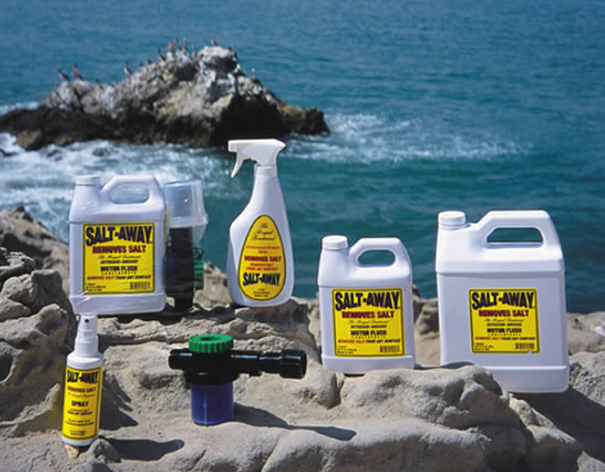
Salt-Away breaks apart and removes salt accumulation with repeated use. Salt-Away can safely be used on all metals, fiberglass, paint, rubber, plastic, chrome, glass, concrete, brick or any surface exposed to salt. Salt-Away, mixed with water, washes away the salt then leaves a protective film on surfaces until surfaces are again exposed to water or salt.
It will not strip wax or cause streaks or spots. It is easy to apply by using pressure or power washers, Salt-Away’s special Mixing Unit, the ready-to-use spray bottles for smaller jobs, and by immersing items into a mixture of Salt-Away and water.
Key Features of Salt-Away:
- Non Hazardous. Contains no hazardous chemicals.
- Non-Toxic. Safe to use around plants, children, pets and all living things.
- Biodegradable. All ingredients biodegrade into the environment.
- Environmentally Safe. Has no deleterious effects in the environment. Safe to discharge into normal drainage outlets connected to filter systems.
- Water based.
- Contains no petroleum products.
- Contains no chemical solvents.

- Does not react chemically or physically as an emulsifier on lubricants and coatings.
- Inhibits rusting and corrosion.
- Completely removes fresh salt.
- Breaks down layers of salt accumulation.
- Is chemically dissimilar to any competitive product.
- Ingredients are the highest quality available.
- Tested to be safe to use on virtually all surfaces, including Magnesium, Aluminum, Iron, Copper, Steel, Stainless Steel, Chrome, Paint, Gel Coat, Nylon, Isinglass, Vinyl, Plastic, Glass, Wood, Leather, Rubber, Canvas, Concrete, Brick.
Salt OFF: Salt Remover and Surface Protector
Protecting against corrosion caused by salt is an issue that ranges from boats used in saltwater to snowmobiles ridden along roads treated with rock salt. Salt Off Concentrate is specifically formulated to quickly and effectively remove salt deposits from metal, fiberglass, plastic or painted surfaces. It contains special polymers that bond to the treated surface to help prevent the formation of future deposits.
Depending on the application, Salt Off can be sprayed directly onto the surface to be treated and then rinsed with fresh water, or simply left in place. An applicator allows it be used to flush engines or to quickly spray the underside of trailers and vehicles that have been exposed to salt. Available in a handy, ready-to-use spray as well as larger concentrated sizes to treat larger areas, Salt Off can also be used with Star brite’s Trailer Spa system.
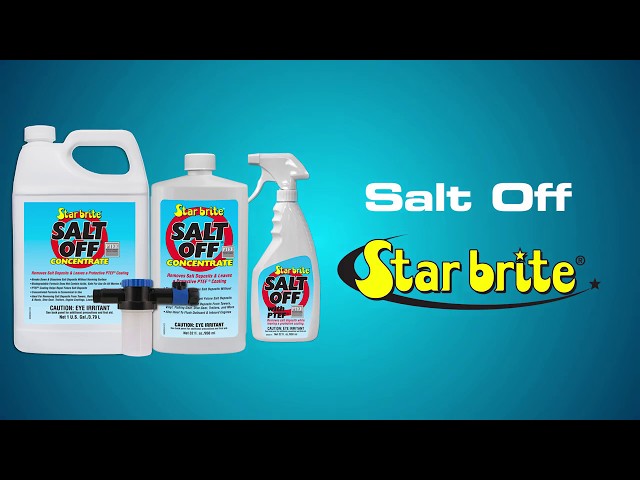
The formula is safe for use on all boats, vehicles, trailers, marine parts, engines, fishing and dive gear and more. It will not etch, stain or otherwise damage metal or plastic surfaces. It is ideal for removing salt water deposits from boats and fishing gear, as well as for protecting cars or trailers from the damage caused by exposure to road salt.
Salt Off is also very effective at protecting marine engines used in salt water; when used with the Salt Off Applicator, it will flush deposits from the engine’s cooling system to help insure maximum performance and service life. The Applicator can also be used to more easily apply Salt Off to large areas.
Key Features of Salt Off:
- Removes salt deposits from all marine surfaces
- Use as a motor flush in I/O and outboard engines
- Rinses away salt buildup on hulls, decks, rails, towers, trailers, diving equipment, rods, reels and more
- Suggested mix ratio for automatic mixers: 1:512 (1 OZ per 4 GALLONS)
- Highly concentrated formula: less product needed per application
Differences Between Salt Off vs Salt-Away
Salt-Away vs Salt Off: Composition
Salt-Away contains a corrosion inhibitor that forms a protective coating on the metal surface after rinsing. Salt Off does not have this feature and only removes salt without leaving any residue.
Salt-Away: The Gentle Giant – Salt-Away is a biodegradable, non-toxic formula designed to remove salt deposits from various surfaces, including marine equipment. Its gentle composition makes it suitable for a wide range of materials, from stainless steel to rubber.
Salt Off: The Heavy Hitter – Salt Off, on the other hand, is a potent cleaner and corrosion inhibitor. It boasts a robust formula that can tackle even the toughest salt deposits. However, its strength can be a double-edged sword, as it may not be suitable for delicate materials.
Salt-Away vs Salt Off: Application
Salt-Away: All-Purpose Cleaner – Salt-Away is versatile and can be used on boats, trailers, fishing gear, and more. Its gentle nature makes it a go-to choice for regular maintenance and cleaning tasks.
Salt Off: Heavy-Duty Performance – Salt Off is best suited for heavy-duty tasks. It’s perfect for when your equipment has accumulated stubborn salt deposits that require a more aggressive approach. However, caution is advised when using it on sensitive surfaces.
Salt-Away vs Salt Off: Protection
Both products are effective at removing salt, but some users have reported that Salt Away works better on stubborn salt deposits and hard water stains. Salt Off may require more scrubbing or repeated applications to achieve the same results as Salt-Away.
Salt-Away: Preventive Care – Salt-Away not only removes salt but also leaves behind a protective coating. This coating acts as a shield against future salt accumulation, making it an excellent choice for long-term maintenance.
Salt Off: Corrosion Fighter – Salt Off’s primary focus is on corrosion prevention. Its potent formula ensures that salt doesn’t eat away at your equipment, providing robust protection, especially in harsh saltwater environments.
Salt-Away vs Salt Off: Environmental Impact
Salt-Away: Eco-Friendly – If you’re environmentally conscious, Salt-Away is the better choice. It’s biodegradable and won’t harm aquatic life, making it suitable for use near bodies of water.
Salt Off: Handle with Care – Salt Off, while effective, should be used with caution near water bodies due to its stronger chemical composition. It’s essential to follow safety guidelines when using this product.
Salt-Away vs Salt Off: Price Point
Salt-Away is more expensive than Salt Off. A 32 oz bottle of Salt Away costs $19.99, while a 32 oz bottle of Salt Off costs $14.99. However, Salt-Away claims to be more concentrated and requires less product per application than Salt Off.
Salt-Away: Budget-Friendly – Salt-Away is generally more affordable, making it an attractive option for those looking to protect their marine equipment without breaking the bank.
Salt Off: Premium Performance at a Price – Salt Off’s superior performance comes at a higher cost. If you’re willing to invest in top-notch corrosion protection, it might be worth the extra expense.
Salt-Away is also more widely available than Salt Off. You can find Salt-Away at most marine supply stores, online retailers, and even some hardware stores. Salt Off is harder to find and may only be available online or at specialty stores.
How do I use Salt Away vs Salt Off?

To use Salt-Away, you need to dilute the solution in water at a ratio of 100 ml of solution per 50 liters of water. Then, spray the solution on the surface you want to clean and let it rest. You do not need to rub or scrub the surface, as the solution will dissolve and release the salt automatically.
To use Salt Off, you need to dilute the solution in water at a ratio of 500 ml of solution per liter of water. Then, spray the solution on the surface you want to clean and rub it gently with a sponge or a cloth if there are any stubborn stains. The solution will remove the salt and leave a protective coating (PTEF) on the surface.
Other Salt Removal Products to Consider
CRC Salt Terminator: This product is designed to flush out salt from engines, cooling systems, trailers, and other equipment. It also lubricates and protects metal parts from corrosion.
Boat Bling Hot Sauce: This product is a spray-on cleaner that removes salt, water spots, mineral deposits, and dirt from boats and other watercrafts. It also adds shine and UV protection to the surface.
If you want a product that can also flush out salt from engines and other equipment, you may want to choose CRC Salt Terminator. If you want a product that can also clean and polish your boat or watercraft, you may want to choose Boat Bling Hot Sauce. Either way, you will be doing your metal a favor by keeping it salt-free and shiny
Pros and Cons of Salt-Away vs Salt Off
Salt-Away and Salt Off are two popular products designed to remove salt deposits and prevent corrosion on marine equipment, boats, and other surfaces exposed to saltwater. Here is a list of the pros and cons of both products:
Pros and Cons of Salt-Away:
| Pros of Salt-Away | Description |
|---|---|
| Effective Salt Removal: | Salt-Away is known for its effectiveness in removing salt deposits from various surfaces, including boat hulls, engines, and fishing gear. |
| Corrosion Prevention: | It contains corrosion inhibitors that help protect metal surfaces from salt-induced corrosion and rust. |
| Biodegradable: | Salt-Away is biodegradable and environmentally friendly, making it a safer choice for use in aquatic environments. |
| Versatile Use: | It can be used on a wide range of surfaces, such as fiberglass, aluminum, stainless steel, and more. |
| Convenient Application: | Available in various forms, including concentrated solutions, sprays, and kits, making it convenient for different applications. |
| Cons of Salt-Away | Description |
|---|---|
| Cost: | Salt-Away can be relatively more expensive compared to some other salt removal products on the market. |
| Availability: | It may not be as readily available as other similar products in all locations, which can be inconvenient for some users. |
| Pros of Salt Off | Description |
|---|---|
| Effective Salt Removal: | Salt Off is designed to effectively dissolve and remove salt deposits from surfaces, preventing the buildup of salt-related issues. |
| Corrosion Prevention: | Like Salt Away, Salt Off also contains corrosion inhibitors that help protect metal surfaces. |
| Easy to Use: | It is available in a convenient spray form, making it easy to apply to various surfaces without the need for mixing or dilution. |
| Wide Availability: | Salt Off is often widely available in marine supply stores and online retailers, making it accessible to many users. |
| Cons of Salt Off | Description |
|---|---|
| Limited Versatility: | Some users may find that Salt Off is less versatile compared to Salt Away in terms of the range of surfaces it can be used on. |
| Environmental Impact: | While Salt Off is generally considered safe for the environment, it may not be as eco-friendly as Salt Away, which is specifically marketed as biodegradable. |
| Cost: | Depending on the brand and packaging, Salt Off can also be relatively expensive compared to basic cleaning products. |
| Residue: | Some users have reported a residue left behind after using Salt Off, which may require additional rinsing. |

In summary, both Salt-Away and Salt Off are effective products for salt removal and corrosion prevention, but they have some differences in terms of environmental friendliness, versatility, and cost. The choice between the two may depend on your specific needs and preferences.
- Both products are designed to remove salt deposits from various surfaces, such as boats, fishing gear, cars, trailers, windows, etc.
- Both products are biodegradable, non-toxic and safe for most materials.
- Salt-Away has a higher dilution ratio than Salt Off, which means it can be used with more water and last longer.
- Salt Off leaves a protective coating (PTEF) on the surfaces after use, which helps prevent future corrosion and rust.
- Salt-Away claims to dissolve and release salt without rubbing or scrubbing, while Salt Off may require some rubbing on stubborn stains.
- Salt-Away is more expensive than Salt Off, but it also has more applications and benefits.
Salt Away vs Salt Off Frequently Asked Questions

1. Can I use Salt Away and Salt Off interchangeably?
While both products aim to combat salt deposits, they have different strengths. Salt-Away is ideal for regular maintenance, while Salt Off is best for heavy-duty tasks. Consider your specific needs when choosing between them.
2. Are these products safe for the environment?
Salt-Away is eco-friendly and biodegradable, making it a safer choice near water bodies. Salt Off, however, contains stronger chemicals, so extra care is needed to prevent environmental harm.
3. How often should I use these products?
The frequency of use depends on your equipment’s exposure to saltwater. Regular maintenance with Salt-Away is recommended, with Salt Off reserved for periodic deep cleaning.
4. Can I use Salt-Away and Salt Off on my fishing gear?
Yes, both products are suitable for cleaning fishing gear and preventing salt-related damage. Again, consider the level of salt buildup before choosing between them.
5. Do I need to rinse my equipment after using these products?
It’s advisable to rinse your equipment thoroughly after using either product to remove any residue. This ensures that your gear remains in top condition.
6. Can I dilute these products for lighter cleaning tasks?
Yes, you can dilute both Salt-Away and Salt Off with water for lighter cleaning jobs, which can help extend their usage.
Salt-Away vs Salt Off: Final Thoughts
Salt-Away and Salt Off are both salt removal products that claim to dissolve salt and prevent corrosion. They are both biodegradable, non-toxic, and safe for the environment. They both come in liquid form and can be applied with a spray bottle, a garden hose, or a pressure washer. Both Salt-Away and Salt Off work on various surfaces, such as aluminum, stainless steel, fiberglass, rubber, plastic, and more.
When it comes to choosing between Salt-Away vs Salt Off, your decision should be based on the specific needs of your marine equipment. Salt-Away is the go-to option for regular maintenance and eco-conscious boaters, while Salt Off shines in heavy-duty corrosion protection. Remember to follow safety guidelines and rinse your equipment after use to ensure longevity.
So, which product is better for you? It depends on your needs, preferences, and budget. If you want a more powerful and convenient product that can also protect your metal from corrosion, you may want to choose Salt-Away. If you want a cheaper and eco-friendly product that can also remove salt from other surfaces besides metal, you may want to choose Salt Off.
In the end, the battle of Salt-Away vs Salt Off is a matter of finding the right balance between cleaning power, environmental impact, and cost-effectiveness. So, which one will you choose for your marine gear?

As always, stay safe, enjoy the journey and please try to leave it cleaner than you found it. If you have any comments, questions, ideas or suggestions please leave them in the comment section below and I’ll get back to you asap. You can follow us on Facebook: Rex The Beach Angler, Instagram: thebeachangler7, Twitter: @AnglerBeach, and YouTube: Man Art Creations.
P.S. – Thanks so much for checking out our blog we really appreciate it. Just so you know, we may receive a commission if you click on some of the links that appear on our site. This helps us keep our content free and up-to-date for everyone. We appreciate your support!

A life long surf fisherman with 50+ years of experience, I am also an avid hunter and outdoorsman. I will be sharing my passion for the outdoors with you so be prepared for hunting, fishing, camping, hiking and more. Along with gear reviews and the latest trends and innovations in the outdoor industry.

